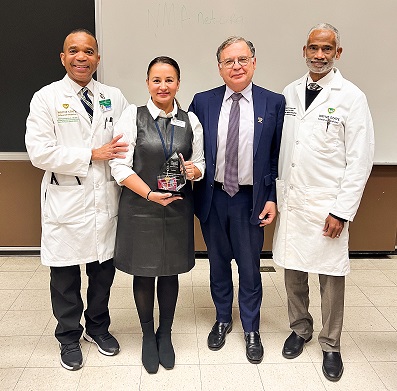
Public health officials must do more to take their message of preventive health to the community level, and need the assistance of health care workers like doctors and nurses to become more effective.
That’s the message delivered by Natasha Bagdasarian, M.D., M.P.H., Michigan’s chief medical executive, who addressed “Michigan’s Health Agenda” during at Nov. 15 special grand rounds at the Wayne State University School of Medicine.
A 2005 graduate of the School of Medicine, Dr. Bagdasarian leads the state’s public health initiatives, advocating for programs and funding to confront issues affecting the state’s population, including vaccination efforts, maternal-fetal health, combatting the opioid epidemic and rising cases of syphilis.
In some ways, Dr. Bagdarsarian said, public health is a victim of its own successes. Because so few people recall the ravages of polio before the Salk vaccine, or know people who live with the effects of the disease, an “out of sight, out of mind” condition sets in, as it did for smallpox. Americans forget the critical role public health played in vaccination efforts to nearly eradicate the diseases.
She noted that in the current political atmosphere a pervasive parental distrust of vaccinations is setting the stage for outbreaks of disease that were brought under control decades ago. A statewide dashboard, for example, can identify public schools in Michigan with a 10% or less vaccination rate. Public health, working with health care systems, must develop methods to break through the distrust to prevent the possibility of outbreaks of measles and other diseases, which can only be contained through “herd immunity.”
With cases of syphilis – a very treatable condition – on the rise, so are cases of congenital syphilis. To assist in confronting the situation, she’d like to see emergency rooms – where many of the patients who display the disease seek treatment – provide routine testing, with the possibility of patients “opting out.”
The United States, she said, has an abysmal preterm birth and fetal-maternal mortality rate among the world’s most prosperous nations. That rate, both nationally and in Michigan, is much higher among Black mothers and babies. One way to lower that rate, Dr. Bagdasarian said, is to advocate for Medicaid-provided doulas, both during pregnancy, at birth and for 12 months post-partum.
The COVID-19 pandemic taught public health officials many lessons, she said, but chief among them was the importance of meeting the public where it is. Bringing vaccines to communities, particularly underserved communities, was key to vaccine acceptance, as demonstrated by the Wayne Mobile Health fleet. Taking vaccines and health services into communities, and relying upon trusted community leaders, increased confidence in vaccines. That lesson must be continued by taking the face of public health into communities and working with community leaders to inspire confidence.
“We have to meet people where they are,” Dr. Bagdarsarian said.
Dr. Bagdasarian also called upon audience members to use their voice to advocate for public health with local, state and federal officials, noting that her own mother frequently writes to the White House.